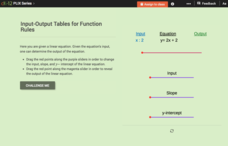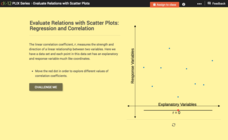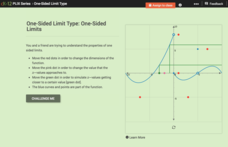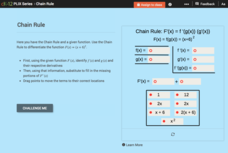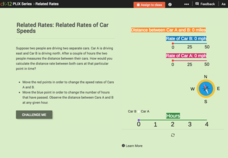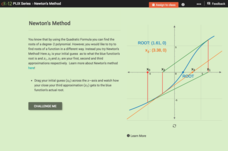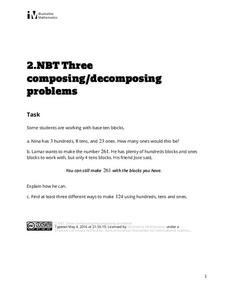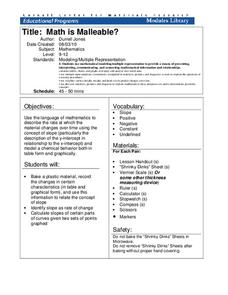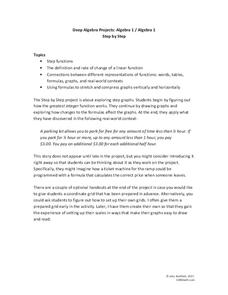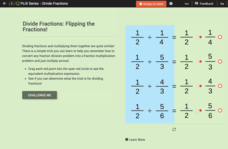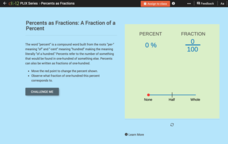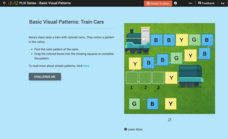CK-12 Foundation
Input-Output Tables for Function Rules
Make the abstract a bit more concrete with an interactive that asks learners to slide an input value through a function to determine the output. Changing the slope and y-intercept allows them to see the how the output values change.
CK-12 Foundation
Frequency Tables to Organize and Display Data: Favorite Films
What information can your class determine if they know the number of people attending movie showings? Using the information about the number of people at each screening, learners develop a frequency table. The pupils analyze the type of...
CK-12 Foundation
Line Graphs to Display Data Over Time: Strawberry Competition
Take the tediousness out of graphing. Using the interactive tool, learners can efficiently create a line graph from a set of data. They then use the graph to answer questions about specific trends in the data.
CK-12 Foundation
Evaluate Relations with Scatter Plots: Regression and Correlation
Introduce the concept of a correlation coefficient using an interactive lesson. Learners begin by manipulating a correlation coefficient and watching a graph change to represent the new value. Questions help strengthen their...
CK-12 Foundation
One-Sided Limit Type: One-Sided Limits
Not everything that's one-sided is bad. A slider interactive aids learners in investigating one-sided limits from graphs. A set of challenge questions assesses their understanding of the relationship between one- and two-sided limits.
CK-12 Foundation
Chain Rule
Keep it on the chains. Pupils work through the steps in the chain rule using the interactive as a guide. Learners identify the two composed functions and their associated derivatives from a set of choices. They continue on to build the...
CK-12 Foundation
Related Rates of Car Speeds
Speed up your pupils' understanding of derivatives. Two cars travel in perpendicular distances to each other. With the aid of the interactive, learners visualize the situation. Pupils use the derivative to calculate the instantaneous...
CK-12 Foundation
Newton's Method
Does the accuracy of the first guess make a difference down the line? Learners investigate the effects of the iterative process of finding roots, using Newton's Method. By moving the initial guess of a root on a graph, pupils observe the...
West Contra Costa Unified School District
Average Rate of Change
The concept of slope gets an approachable, yet theoretical, treatment in a comprehensive algebra lesson. The use of functional notation and problem-solving techniques keep the material rigorous, but detailed teaching notes and lots of...
CK-12 Foundation
Method of Cylindrical Shells
Approximate the volume of a solid of revolution. Using a method similar to approximating the area under a curve, pupils investigate the volume of a solid of revolution. The learners use a given definite integral to find the volume of...
CK-12 Foundation
Finding the nth Term Given the Common Ratio and the First Term: Dominoes
Topple misunderstandings of geometric sequences. Using a context of creating ever-increasing sizes of dominoes, pupils develop a geometric sequence. The scenario provides the size of the first domino and the common ratio between...
CK-12 Foundation
Limit of a Sequence: Finding the Limit of a Sequence (Part 3)
Limit the view of sequences on both sides of the axis. Learners explore an alternating sign sequence. Using a graphical display of the first 10 terms of the sequence, pupils determine the formula for the general term. they then use the...
Illustrative Mathematics
Three Composing/Decomposing Problems
Practice composing and decomposing numbers in base-ten using three word problems. Each problem presents a different scenario requiring learners to explain their thinking, find the number of ones, and find out different ways to make a...
Cornell University
Math Is Malleable?
Learn about polymers while playing with shrinky dinks. Young scholars create a shrinky dink design, bake it, and then record the area, volume, and thickness over time. They model the data using a graph and highlight the key features of...
A to Z Teacher Stuff
Counting Valentines
This Valentine's Day, add a touch of festive flair to your math lesson with a booklet that combines counting, reading, and a sweet treat. Young mathematicians read a poem, count candy hearts, and record the amount of each color found.
5280 Math
Step by Step
One step at a time! A seemingly linear relationship becomes an entirely new type of function. Young scholars build their understanding of step functions by completing a three-stage activity that incorporates multiple representations of...
College Board
Coke® Versus Pepsi®: An Introductory Activity for Test of Significance
Most people claim they can tell the difference between Coke and Pepsi. Scholars conduct a fun experiment to test that claim! Once learners collect their data, they analyze the results and determine if the statistics are significant.
College Board
2005 AP® Calculus AB Free-Response Questions Form B
Grab a peak inside the test. The 2005 free-response questions from the AP® Calculus exam allow learners to see how topics appear on the tests. Topics cover differential equations, bounded areas, particle motion, and slopes of tangent lines.
CK-12 Foundation
Quotients of Fractions: Flipping the Fractions!
Five questions make up an interactive designed to promote math skills involving the division of fractions. To assist in the process, a tool with moveable parts showcases how fractions are flipped. Question types include multiple-choice,...
CK-12 Foundation
Percents as Fractions: A Fraction of a Percent
Five questions make up an interactive all about percents and fractions. Mathematicians answer multiple-choice and fill in the blank problems with help from a tool that converts percents to fractions using a sliding bar. An open...
CK-12 Foundation
Basic Visual Patterns: Train Cars
An interactive comprised of five questions challenges young scholars to complete a simple pattern. After examining a train with colored carts, learners arrange a green, blue, and yellow block into their corresponding space. Questions are...
CK-12 Foundation
Area and Volume of Similar Solids: Similar Solids
Five questions make up an interactive designed to boosts knowledge of area and volume of solid figures. Question types include multiple-choice, true or false, and fill-in-the-blank. A scale model changes measurement to provide a visual...
Curated OER
How Many in My Home?
Engage young mathematicians in practicing their counting skills while learning a little about the home environment of your students with this simple worksheet. By asking students to determine the number of windows, doors, rooms, people,...
Blogger
Integer Operations Posters
Eliminate young mathematicians' confusion over performing operations with integers using this set of classroom displays. Providing learners with simple, easy-to-follow rules, this resource will have students fluently adding,...
Other popular searches
- Kinesthetic Learner Math
- Anesthetic Learner Math
- Math for Visual Learner
- Kinesthetic Learner + Math
- Kinesthetic Learner Math Time
- Visual Learner Math
- Anesthetic Learner Math Time
- English Learner Poetry Math
